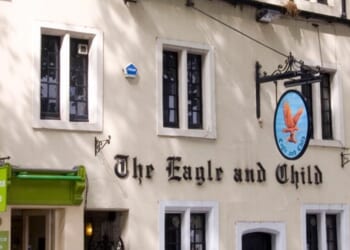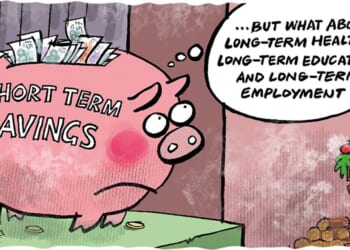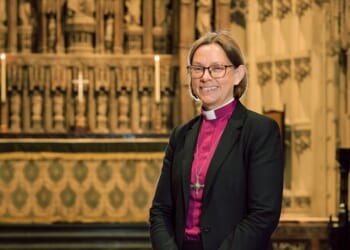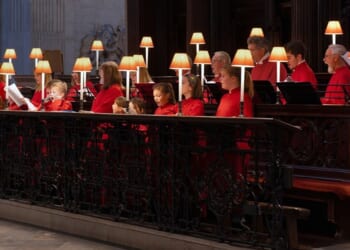Proposed changes to marriage law
From Dr Phillip Rice
Madam, — For a headline reform, the amounts of money at stake in the Ministry of Justice wedding proposals are eye-watering (News, 10 October).
I summarise the October press announcement: the change could create 12,000 jobs, support 1800 businesses, and be worth a total net present value of £535 million at 2019 prices. My concern, from a lifetime of public-sector cost-benefit studies, is that these figures are partial: the benefits are optimistic, and the transitional costs/the losers are not well covered.
The onus of reform is that the duplication is removed, but it is widely optimistic to see the transition to a wholly new system of celebrant-led change away from the established test of approved building going ahead without a set of tests to ensure the solemnity and dignity of marriage. Such tests will have their own timescale and costs to consider properly.
The key assumptions are that reform will boost the number of weddings by three per cent, and a large number of couples (117,000) will benefit by the saving on the need to have an additional legal wedding outside the register office. The latter is assessed as worth £18 million per year and £152 million as present value over a ten-year-period. These figures are taken from the July 2022 Ministry of Justice/Law Commission impact assessment, which underpins the October press release. For example, the assessment for the losses to the Anglican Churches (England and Wales) is £5.6 million.
Overall, it is plausible to see that reform on the above numbers would herald a boom time for celebrants, for the top end of the wedding market — where the events costs for hospitality/entertainment-type companies would generate the forecast job growth.
I hope that there will be a very careful response from the Church’s national and diocesan authorities to the next stage when proposed legislation is expected in 2026. And there needs to be a more thorough appreciation of the costs involved in offering secure processes against fraud and non-marriage while maintaining the solemnity and dignity of marriage for all the religious and non-religious groups in England and Wales.
PHILLIP RICE
General Synod representative for the diocese of London
23 Christchurch Square
London E9 7HU
Durham research into the Soul Survivor scandal
Madam, — After some half a century of regular church attendance, I have been prompted by a friend to write out “Things I wish I’d known when I began what I’d now call the Christian journey”.
No. 1 on the list was this: “That the most significant earthly influences on any Christian’s spirituality, decision-making, hermeneutics, choice of church, Christian discipleship, etc., is the combined effect(s) of their felt needs, ambition, temperament, personality, psychoses, character, upbringing, culture, sub-culture, social class, education, nationality, tribe, world-view, and so on.”
Any member of any Christian tradition can be manipulative. The conclusions of the Durham report (News, 3 October) reminded me of reading 1 John down the years: if, indeed, it was John’s authorial intent to challenge the errors of proto-Gnosticism or Gnosticism circulating in the Early Church (with all its sense of the enlightened having “the anointing”, spiritual one-upmanship, and receiving “revelations”), then that epistle, in its canonical context, is worthy of hard self-reflection by Charismatic and non-Charismatic Evangelicals.
We must neither be blind to the failings of ourselves, our traditions, and sub-cultures, nor express beliefs in ways which exploit others’ vulnerability. I have observed quasi-cultic levels of control, in local churches and para-church organisations, sadly, more than once.
NAME AND ADDRESS SUPPLIED
Future of the religious life in the C of E
From the Revd Dr Charlie Baczyk-Bell
Madam, — I read with interest the Revd Dr Nicholas Buxton’s article on the Society of the Sacred Mission’s (SSM’s) “completion” in England, and the emphasis quite rightly now placed on next steps in the renewal of religious life in the Anglican tradition (Comment, 10 October).
I wanted to write to highlight another such renewal, beyond these shores. I am delighted to look out from the pulpit of my parish and see the sprightly 80-year-old member of the SSM, Sunday by Sunday. As part of his faithful ministry as a religious, much of which he served in Lesotho, Fr Robert has been responsible for countless vocations, among which have included a number to the SSM.
As a result, and alongside fruitful and faithful local engagement on the ground, the SSM is thriving once again as a religious order in Lesotho and South Africa. Your readers may know of the anti-apartheid and reconciliation work of one its current members, Fr Michael Lapsley, and we were blessed recently to have sent a parish group to see the work of the Lesotho branch of the SSM.
Holding fast to that which is and seeking that which is to come is surely the life of renewal that the legacy and present of religious communities can offer to the Church. Thanks be to God for the SSM, and for the life of witness to which our religious communities, in all their guises, are called.
CHARLIE BACZYK-BELL
Associate Vicar, St John the Divine, Kennington
Address supplied (London SW9)
‘King’s Army’ march in Old Compton Street, Soho
From the Revd Benjamin Edwards
Madam, — We must speak plainly and urgently to the wider church community and to those following the news about the group calling itself the King’s Army, and its march through Old Compton Street, in London, earlier this month. The actions, rhetoric, and uniformed spectacle of this group — protesting in Soho, a historic hub for the LGBTQ+ community — are being presented as Christian evangelism, but they are not. Their stated aim of protesting against “immoral culture” and calling believers to “fight like soldiers” is fundamentally inconsistent with the actual gospel message of God’s radical, all-inclusive love and redemption.
The core of the issue lies in the method of outreach: Jesus did not form a paramilitary group to march in a city’s social districts and intimidate people with judgement. Furthermore, the focus of their “fight” is deeply misguided. The King’s Army claims to be “at war with sin and the devil”, and yet their actions have been solely directed at people — specifically the LGBTQ+ community — making them feel unsafe in their own neighbourhood.
God’s work is never about creating fear or shaming individuals into external compliance: it is about the transformation of the heart through the Holy Spirit. If we are called to a “spiritual fight”, our posture should be one of humble prayer, self-reflection, and tireless advocacy for the vulnerable, not public aggression towards our neighbours. The Son of God, the ultimate embodiment of God’s love, came in humility, not with a uniform and a military formation.
For this reason, we must not be silent. Silence is complicity. When a group weaponises Christian language and symbols for acts of hostility, it damages the credibility of the gospel and inflicts real pain upon God’s children. I urge all church leaders to issue clear and unequivocal statements distancing their congregations and ministries from these actions.
BENJAMIN EDWARDS
Address supplied (Suffolk)
Julian and the woe of a mass-extinction even
From Liz MacWhirter
Madam, — I wrote the article (Faith, 3 October) on the use of trauma-informed poetry to help people to process ecological grief, but I did not write its headline, “How all may yet be well”, which is at odds with the article’s subject: ecological collapse.
Given the sixth mass-extinction event, I would never state such a thing. To quote Luis Tagle, as he addressed fellow Cardinals and the Pope on sexual abuse in the church: if we deny death, we become death. The headline is morally freighted.
In my Ph.D. research, using medieval literary scholarship and trauma theory, I challenge this very tendency today to quote Julian of Norwich out of context to suggest a providential promise. To do so negates the nuanced power of Julian’s modelling of spiritual consolation “in woe as in well” which can help us to respond to the polycrisis in which we are complicit. Such complex reality can be held by trauma-informed faith.
We share the urgent collective need to bear witness to what is happening to wounded bodies, hurting places, and collapsing ecosystems: eyes-wide-open, heart-full thinking, taking in as much reality as possible. Isn’t hope more about doing the right thing without promise of an outcome?
LIZ MacWHIRTER
Addres supplied
More responses to Bishop Mullally’s nomination
From Mr Steve Vince
Madam, — I could not help experiencing a sense of “déjà vu” on reading Dr R. W. Dyson’s letter (10 October) bewailing the appointment of Bishop Mullally to Canterbury as “the final nail in the coffin” of prospects for reunion between the Church of England and the Roman Catholic Church. Very much the same sort of thing was said when we had our first women priests, our first women bishop, and our first woman diocesan bishop.
While I would love to see the Anglican and Roman Communions united, the conditions laid down by Rome are simple, and were made unmistakably clear by the then Cardinal Ratzinger in his dismissal of the ARCIC documents, which occurred before the 1992 vote for women priests in the C of E: Either you submit to our authority and our doctrine in their entirety (as the Ordinariate does), or no deal.
If Dr Dyson and his fellow travellers want to locate the nails in the coffin of reunion, they should be looking there.
STEVE VINCE
13 Selwyn Close
Wolverhampton WV2 4NQ
From the Revd David Francis
Madam, — When I was called out of retirement and appointed Rural Dean of Cadbury by the Bishop of Exeter in 2018, the commissioning service was conducted by the Bishop of London. Bishop Mullally had been elected and confirmed in office, but awaited installation, and, having relinquished the suffragan see of Crediton, was acting as an Assistant Bishop in this diocese.
I had been ordained deacon and licensed as assistant curate of Ealing by the then Bishop of London, Dr Graham Leonard. This gave a sort of completeness to my ministry, installed in my first and last offices by the same diocesans. Dr, subsequently Mgr, Leonard, who ordained women as deacons, would not ordain them as priests, and would join the Roman Catholic Church. In the thirty years since my ordination, the Church of England had evolved. Now, with Bishop Mullally’s translation to Canterbury, that evolution has reached the appropriate conclusion.
DAVID FRANCIS
East Forches
Alexandra Road
Crediton EX17 2DH
Theological language
From Mr David Edgerton
Madam, — Professor Richard Bauckham’s magisterial letter (3 October) is comprehensive in its argument and yet conveys everything that is wrong with so much theology today. It’s the language of “Jabberwocky”, understood only within the confines of a Christian language game.
The circularity begins with creation. What does he mean by it? All that there is? Where does that leave God? Does he mean all that exists? Is he harking back to Aquinas’s assertion that God is existence itself, a notion that makes little sense outside medieval philosophy? His use of “utterly distinct” and “utterly different” throws little light on the subject for the ordinary reader.
The Professor also tells us that “Jesus is God” (a statement that, incidentally, is not to be found in the New Testament). Yet how strange that Jesus seemed to use straightforward but challenging parables to invite his hearers to experience God’s presence, without the need for lengthy, gobbledygook explanations.
We can speak of God only in pictures and parables, and to pretend otherwise, by retreating into a linguistic ghetto, is delusional.
DAVID EDGERTON
179 Saughall Road
Moreton, Wirral CH46 5NQ
The Bede Centre report on the eucharist
From Mr Jon Smith
Madam, — If the Church of England wants to start 10,000 new worshipping communities, then it needs to change the rules about who can lead a celebration of holy communion.
That is my summary of the Bede Centre’s report The Communion Dilemma. Or, in the report’s own words: “If the edges are not allowed to renew the centre (i.e. the Church’s inherited liturgical traditions), then those leading new things are being set up to fail and the wider Church will not benefit from their ministry.”
I hope and pray that this issue will get on to the General Synod’s agenda via a private member’s motion.
JON SMITH
13 St John’s Street
Duxford
Cambridge CB22 4RA
The Editor reserves the right to edit letters

















